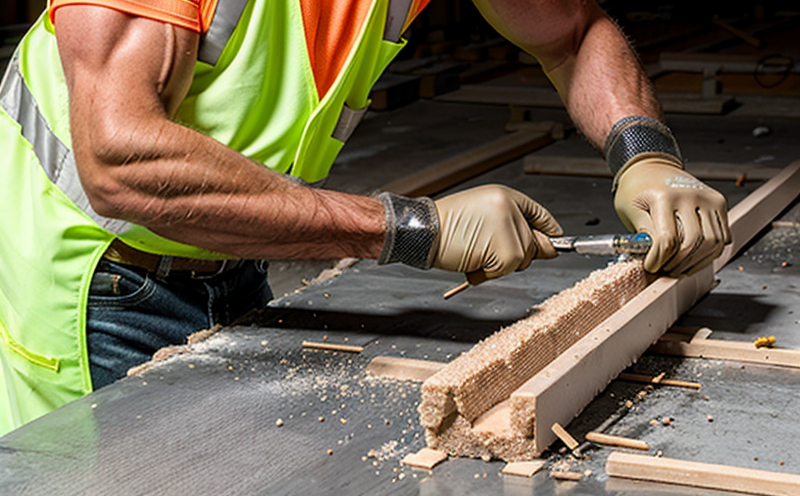Testing the shear strength of different adhesives used in construction to ensure reliable bonding
The Importance of Testing Shear Strength Ensuring Reliable Bonding in Construction
In the world of construction, a strong and reliable bond between materials is crucial for the integrity and safety of buildings. Adhesives play a vital role in achieving this bond, but their effectiveness can vary greatly depending on the specific type used. Thats where testing the shear strength of adhesives comes in a critical laboratory service that ensures the adhesive being used can withstand the stresses and strains of the construction process.
What is Testing Shear Strength?
Testing the shear strength of adhesives involves subjecting them to intense pressure and stress, simulating the conditions they will encounter in real-world applications. This process helps determine whether the adhesive can maintain its bond under load, ensuring that structures remain stable and secure.
At Eurolab, our team of experienced technicians utilizes state-of-the-art equipment to conduct thorough shear strength testing on a wide range of adhesives used in construction. Our laboratory services provide businesses with the confidence they need to select the most suitable adhesive for their specific needs.
The Benefits of Testing Shear Strength
Incorporating testing the shear strength of adhesives into your quality control process offers numerous advantages
Improved Structural Integrity By selecting an adhesive that has been proven to withstand the stresses and strains of construction, businesses can ensure that their structures remain stable and secure.
Reduced Risk of Failure Testing shear strength helps identify potential weaknesses in adhesive performance, reducing the risk of costly failures and downtime.
Enhanced Productivity With a reliable adhesive in place, construction teams can work more efficiently, knowing that they have a strong bond to support their efforts.
Compliance with Regulations Meeting industry standards for adhesive performance is essential; testing shear strength helps businesses demonstrate compliance and avoid potential liabilities.
Key Benefits of Eurolabs Shear Strength Testing Services
At Eurolab, our team provides comprehensive shear strength testing services that cater to the unique needs of construction companies. Our services include
Variety of Adhesives Tested We test a wide range of adhesives used in construction, including epoxy, polyurethane, acrylic, and more.
Customized Testing Programs Our team works with clients to develop tailored testing programs that meet specific requirements and project needs.
Quick Turnaround Times We understand the importance of timely results; our laboratory services ensure that you receive your test reports quickly, without sacrificing accuracy or quality.
QA Common Questions about Shear Strength Testing
Q What types of adhesives can be tested for shear strength?
A Eurolab tests a wide range of adhesives used in construction, including epoxy, polyurethane, acrylic, and more. Our team will work with you to determine the best testing program for your specific adhesive needs.
Q How is shear strength testing conducted?
A Our technicians utilize state-of-the-art equipment to subject adhesives to intense pressure and stress, simulating real-world conditions. We then analyze the results to determine the adhesives performance under load.
Q What information can I expect from a shear strength test report?
A Our comprehensive reports provide detailed analysis of the adhesives performance, including shear strength values, failure modes, and recommendations for future testing or adhesive selection.
Q Why is testing shear strength important in construction?
A Testing shear strength ensures that adhesives can withstand the stresses and strains of construction, reducing the risk of costly failures and downtime. It also helps businesses meet industry standards for adhesive performance.
Conclusion
In conclusion, testing the shear strength of adhesives used in construction is an essential component of quality control processes. By partnering with Eurolabs experienced technicians and state-of-the-art laboratory services, businesses can ensure that their structures remain stable and secure while meeting regulatory requirements.
Dont risk the integrity of your buildings choose Eurolab for all your shear strength testing needs. Our team looks forward to collaborating with you to develop a customized testing program tailored to your specific requirements.
Additional Resources
For more information on our shear strength testing services or to schedule a consultation, please visit our website at website URL.
-
Testing the resistance of materials to forces that cause sliding or shearing failure
-
Simulating conditions where materials are subjected to lateral forces that could cause them to shear
-
Evaluating the shear strength of adhesives, coatings, and fasteners used in construction
-
Testing for material failure along internal planes or bonding points under shearing stresses
-
Verifying that building materials remain stable under conditions of lateral or horizontal movement
-
Ensuring that materials used in joints and connections resist shear forces during building operation
-
Simulating earthquake or wind forces to assess material performance under dynamic shear loading
-
Ensuring that structural connections, including bolts and welds, maintain their integrity under shear forces
-
Testing how materials perform when subjected to forces that cause one layer or part to slide over another
-
Ensuring that the shear strength of structural elements like beams and columns meets safety requirements
-
Testing for shear failure in building materials like wood, concrete, or steel to ensure durability
-
Simulating dynamic loading scenarios to test the shear performance of construction materials over time
-
Ensuring that shear forces do not compromise the overall stability of construction components
-
Verifying that materials used for exterior cladding or partitions maintain their shear strength under pressure
-
Testing the effect of shear forces on materials used in foundations and load-bearing walls
-
Evaluating shear strength in composite materials and their ability to resist splitting or separation
-
Simulating shear forces caused by external factors such as wind, seismic activity, or traffic loads
-
Testing the shear capacity of materials used in roadways, bridges, and transportation infrastructure
-
Ensuring that shear failure does not lead to catastrophic structural damage in high-rise buildings
-
Verifying the shear resistance of materials used for roofing and walling to prevent buckling under stress
-
Ensuring that materials used in earthquake-prone areas can withstand shear forces without breaking or shifting




